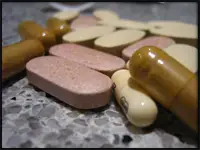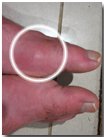|
[?]Subscribe To This Site
|
GOUT BLOG
Related to Kidney disease, and also Heart Failure, Sleep Apnea, obesity, kidney stones, spinal problems,and joint maiming
The Gout Aware StoryThe Gout aware story of how a Gout symptom sufferer started Gout Aware the website for Gout sufferers Permalink-- click for full blogArnica GoutArnica Gout is not a real Gout term as Arnica is only a healing tool to help alleviate gouty symptoms. Permalink-- click for full blogTreating Gout Symptoms using CherriesThere are many gout remedies available, one is Treating Gout Symptoms using Cherries href="http://www.gout-aware.com/treating-gout-symptoms-using-cherries.html">Permalink-- click for full blog Flax Seed Oil and GoutThere are many Gout remedies and one is Flax seed oil and Gout which is an unusual marriage in maintainence. Permalink-- click for full blogGout Blog Canine GoutThough Rare dogs can get Canine Gout which is a form of Gout that similar to Human Gout. Permalink-- click for full blogNew York Times Latest Gout informationLatest information on Gout from the New York Times. href="http://topics.nytimes.com/top/reference/timestopics/subjects/o/oils_and_fats/index.html?query=GOUT&field=des&match=exact&rss=1" target="_new">Click for more info Gout FactsGout Facts Permalink-- click for full blogMedical Feeds
href="http://www.medical-feeds.com/rss2html.php?XMLFILE=http://www.medicalnewstoday.com/rss/gout.xml" target="_new">Click for more info Gout and AlcoholThere are extremely strong links between Gout and Alcohol which have been researches extensively. Permalink-- click for full blogHave A Great Story About This Topic?Do you have a great story about this? Share it! What Other Visitors Have SaidClick below to see contributions from other visitors to this page...
Gout free! 66 years old with a long time gout problem
gout institute in viet nam what can we do for curer gout ? Not rated yet
Finally refief from gout!!! I shared this product with my father who suffers from gout :) Not rated yet "“People wish their enemies dead, but I do not; I say give them the gout, give them the stone!”! 'Mary Worley Montagu ' Gout Blog: A study led by a team of scientists in Scotland suggests that genes may play a part in increasing one's risk of developing gout, a painful condition that affects the joints. The study is published in the 9 March online issue of Nature Genetics and is the work of researchers based at the MRC Human Genetics Unit, Western General Hospital, Edinburgh, and colleagues from other research centres in the UK and also in Croatia and Germany. Gout (also called metabolic arthritis) is a painful condition caused when uric acid, a waste product of purine metabolism that in humans and great apes is mostly excreted via the kidneys into urine, deposits in the joints. In some people the kidneys don't clear all the uric acid from the bloodstream, a condition that is called hyperuricemia. Some 10 per cent of people with hyperuricemia go on to develop gout, where uric acid is deposited in the joints as monosodium urate crystals, resulting in inflammation and often considerable pain. The condition usually affects the joint of the big toe, but it can also affect fingers, elbows, ankles, knees and other joints. Causes of gout have often been attributed to diet and lifestyle, with overconsumption of protein, refined sugar and alcohol being the main culprits, but the mystery that has remained is why thousands of people with these lifestyles don't develop gout. The answer, according to this study, could be genetic. The researchers studied the genes of more than 12,000 people and found that a gene variant may increase or lower the risk of a person developing gout. The gene variant in question is called SLC2A9, already known to scientists as a transporter of fructose, but in this new study, the researchers, led by Professor Alan Wright of the MRC Human Genetics Unit, found the variant also plays a key role in transporting uric acid. Wright and colleagues found that between 1.7 and 5.3 per cent of the variance in blood levels of uric acid was explained by the presence of this gene variant in a Croatian population sample, and that SLC2A9 was also linked with low levels of uric acid excretion and/or gout in population samples from the UK, Croatia and Germany. The presence of the gene variant appears to impede the ability of the kidneys to filter uric acid from the bloodstream. According to a BBC News report, Wright said that: "The gene is a key player in determining the efficiency of uric acid transport across the membranes of the kidney." The level of risk that a person has for gout will depend on which form of the gene they have inherited, said the researchers, who hope this discovery will lead to the development of improved diagnostics for the condition. The traditional view of gout is often associated with historical stereotypes of overindulgent people who eat and drink to excess, but in reality this often not the case, with estimates placing about 1 million people in the UK suffering from some form of gout. A representative of the British Society for Rheumatology, Professor Stuart Ralston told the BBC that he often saw people with gout who did not fit the stereotype of excessive drinking and eating of rich food, saying he knew of many patients that were "quite abstemious". Perhaps this study reveals a genetic marker for gout risk, he said, and that it could be a "target for new gout drugs". There are few medications that treat gout. Another expert told BBC News there appears to be a link between this study and another one that suggested excessive drinking of sugary soft drinks also increased the risk of gout, since the gene variant that appears to control the ability of the body to remove uric acid from the blood is the same one that transports fructose, a sugar often found in soft drinks. "SLC2A9 is a newly identified urate transporter influencing serum urate concentration, urate excretion and gout.Veronique Vitart, Igor Rudan, Caroline Hayward, Nicola K Gray, James Floyd, Colin NA Palmer, Sara A Knott, Ivana Kolcic, Ozren Polasek, Juergen Graessler, James F Wilson, Anthony Marinaki, Philip L Riches, Xinhua Shu, Branka Janicijevic, Nina Smolej-Narancic, Barbara Gorgoni, Joanne Morgan, Susan Campbell, Zrinka Biloglav, Lovorka Barac-Lauc, Marijana Pericic, Irena Martinovic Klaric, Lina Zgaga, Tatjana Skaric-Juric, Sarah H Wild, William A Richardson, Peter Hohenstein, Charley H Kimber, Albert Tenesa, Louise A Donnelly, Lynette D Fairbanks, Martin Aringer, Paul M McKeigue, Stuart H Ralston, Andrew D Morris, Pavao Rudan, Nicholas D Hastie, Harry Campbell and Alan F Wright.Nature Genetics Published online: 09 March 2008DOI:10.1038/ng.106. gout blog: Written by: Catharine Paddock, PhDCopyright: MedicalNews Today RSS FEEDGout Blog Sources: Journal abstract, BBC News.
Links worth looking atWeb Directory - Internet Web Directory organized by category, offers rich content and well designed web sites. Submit your URL today! Mesothelioma Treatment For Gout And The Condition's Protective EffectsGout Blog: The goal in treating patients with gout is to reduce acute attacks by lowering serum urate levels, which are usually high in this disease. At the same time, high serum urate levels have been shown to lower the risk of developing Parkinson's disease (PD). A new study compared the safety and efficacy of febuxostat, a new drug being developed for gout that was recently approved for use in Europe, and a commonly used drug that has been around for years. Another study examined the link between gout and PD in individuals 65 years and older. The studies were published in the November issue of Arthritis Care & Research (http://www3.interscience.wiley.com/journal/77005015/home). For many years, the most common drug used to treat gout was allopurinol, which is generally safe and effective, but has been known to cause life-threatening rashes in rare cases. Its dosage often has to be reduced in patients with impaired kidney function, but previous clinical trials have shown that febuxostat is effective at lowering urate levels and that its dosage may not need to be adjusted. A Phase III, randomized, double-blind multi-center trial, known as the APEX (Allopurinol- and Placebo-Controlled, Efficacy Study of Febuxostat) trial, was conducted to compare the safety and efficacy of febuxostat with allopurinal and a placebo in patients with high urate levels (uricemia) and gout, some of whom had impaired renal function. It was the largest randomized controlled clinical trial to date comparing the two drugs. Led by H. Ralph Schumacher of the University of Pennsylvania, the 28-week trial involved 1,072 patients at 167 sites in the U.S. who had serum urate levels of at least 8 mg/dl and gout, with normal or impaired renal function. Patients were randomized to receive one of three dosage levels of febuxostat once daily; allopurinol; or a placebo. The allopurinol dose given was based on kidney function; those with normal function received half the normal dose. The results showed that a significantly greater proportion of patients receiving febuxostat at any dose achieved serum urate levels below 6 mg/dl for the last three months in which they participated in the trial. In those with impaired kidney function, about half in the febuxostat groups reached this level, while none of the patients with renal impairment who received the lower dose of allopurinol reached it. During the first eight weeks, more patients receiving febuxostat needed treatment for flares compared with the other groups. This may have been due to a more abrupt lowering of urate levels that caused crystal mobilization. Adverse events, mostly mild to moderate, occurred with similar frequency across the treatment groups. The authors conclude that febuxostat's effects at these dosage levels "are significantly greater than those produced by the commonly used doses of up to 300 mg of allupurinol or by placebo," adding that "The efficacy of febuxostat in subjects with renal impairment is promising and warrants further study." In another study published in the same issue, researchers led by Hyon Choi of the Arthritis Research Centre of Canada in Vancouver, identified 11,258 patients aged 65 or older with gout and 56,199 age and sex matched controls. They divided the gout patients according to those who were being treated with at least one prescription (72 percent) and those who did not receive any prescriptions for anti-gout medication during the study period, which was 1991 to 2004. They also included data on other medical conditions and medication use, such as diuretics and nonsteroidal anti-inflammatory drugs (NSAIDs) known to be associated with gout or PD risk. During the follow-up period, which averaged about eight years, they identified 1,182 new cases of PD. They found a 30 percent reduction in the risk of PD among those with a history of gout, independent of age, sex, prior medical conditions and use of diuretics and NSAIDs. "These findings lend further support to the purported protective role of uric acid against PD," the authors state, adding a potential caution that lowering urate levels too much too long might also have harmful neurodegenerative consequences such as PD. Gout Blog----------------------------Article adapted by Medical News Today from original press release. |
|












